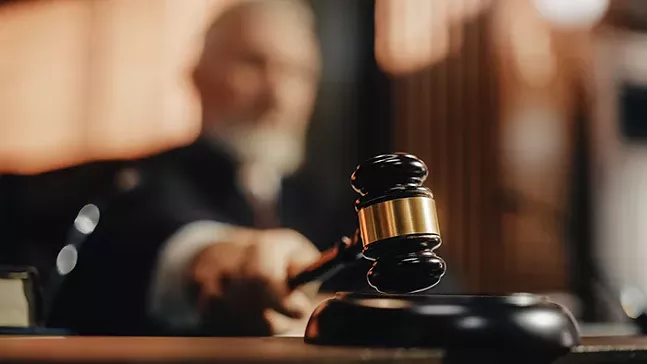Pittsburgh law firm argues “first-of-its-kind” case in front of state Supreme Court | News | Pittsburgh
The Pennsylvania Supreme Court traveled to Pittsburgh this week to hear oral arguments on a range of conditions, which include one that the appellants’ legal professionals say is the initially of its form nationally.
The circumstance, Scott v. Pennsylvania Board of Probation and Parole, requires 4 men and women who ended up convicted of felony-murder in their late teens or early 20s, and have each individual used involving 24 and 48 a long time in jail. They are remaining represented by the Pittsburgh-based advocacy team Abolitionist Regulation Heart, the Amistad Law Project, and the Center for Constitutional Legal rights. The appellants submitted fit in opposition to Pennsylvania’s parole board in July 2020, suing for permission to apply for parole, an prospect denied to them by the state’s felony-murder rule.



“Persons in Pennsylvania who are serving lifetime sentences do not have the chance of parole,” states Bret Grote, who argued on behalf of the appellants on April 13, “and the only way they are staying taken out from jail in the too much to handle vast majority of the circumstances is in a physique bag.”




Pennsylvania is 1 of extra than 40 states with a felony-murder regulation. If a demise takes place whilst a felony is getting dedicated, participants in the felony can be charged with murder — even if they played no direct position in the loss of life and didn’t intend or foresee it. There are a lot more than 1,000 persons in Pennsylvania serving Life With out Parole for felony-murder.



The case turns on two thoughts. One is no matter if you can legally different someone’s parole eligibility from the quantity of time they are sentenced to provide. Is the “sentence” just the necessary duration of imprisonment or does it always involve parole eligibility? The other is whether the Commonwealth Court, which dismissed the original filing by saying they never have the jurisdiction to rule on sentences, was right in their perseverance.
A Pa. felony-murder conviction comes with a necessary sentence of Life With out Parole (LWOP), which appellants’ counsel refers to as unconstitutional “Death-By-Incarceration.” They argue that Pennsylvania’s LWOP sentence has two factors from two various provisions of point out legislation, a lifetime sentence and a denial of parole eligibility. For this reason, they argue, the Commonwealth Court has the authority to restore parole eligibility to people serving LWOP without the need of compromising the “life imprisonment” element of the sentence.
“Parole is a lawful imprisonment,” stated Bret Grote, authorized director of ALC, in entrance of the court docket, arguing that a person paroled from a life sentence is nevertheless less than authorities control. He classified parole eligibility as 1 of a lot of “questions of penal administration and jail willpower that can be altered without the need of disturbing the sentence that was imposed by the felony court docket.”



“Life Devoid of Parole is a common discursive linking,” Grote argued. “It’s considered of as a one notion in the way that it’s skilled by petitioners, but Everyday living Devoid of Parole is in fact a construct that has two components,” he states, referring to the sentence imposed by the prison court and a parole perseverance in accordance to a different provision of state regulation. For that motive, the appellants argue, they can legally obstacle their parole eligibility with out “disturb[ing] the finality of the judgment of a court docket.”




The state’s lawyer, Robert M. Eisenberg, suggests the state Supreme Courtroom lacks jurisdiction in this situation simply because denial of parole and a existence sentence are one and the exact. “Pennsylvania regulation obviously suggests that daily life imprisonment in and of itself precludes parole,” he argues. For this rationale, he argues, the appellants’ suit issues their sentences and should comply with the processes of the Publish-Conviction Reduction Act (PCRA).



“Because [parole eligibility] is portion of the sentence, it can be challenged by the PCRA and only the PCRA,” he says.



Grote contends that the PCRA are not able to adequately provide reduction for the appellants, due to procedural specifics. 



Eisenberg argues that the Parole Code stipulates that the board has no electricity to even consider parole right until the bare minimum sentence has been served. Considering that a LWOP sentence lacks a minimum amount (or, its minimal and greatest are the exact), men and women serving those sentences are definitively ineligible for parole. If you challenge the deficiency of a minimal sentence on a life sentence, you would be complicated the sentence by itself, Eisenberg maintains, which have to be done as a result of the PCRA.



In a press release distributed by the appellants’ counsel following the summary of oral arguments on April 13, the appellants’ counsel argues that “Pennsylvania’s Loss of life-By-Incarceration sentencing plan both equally displays and exacerbates the racial disparities in the state’s legal justice and penal units,” noting that Black Pennsylvanians make up about 70% of men and women serving LWOP, irrespective of remaining only 11% of the state’s population. 




“Overall in the state, Black people today are sentenced to Loss of life By Incarceration at a charge 18 situations higher, and Latinx men and women at a level five moments larger, than white folks,” the release suggests.



“This situation is on behalf of Black elders and all of individuals who have been denied redemption,” claimed Samah Sisay, attorney and Bertha Justice Fellow at the Middle for Constitutional Rights. “Through its obligatory sentencing plan and an incapability to request parole, Pennsylvania has disproportionately and unconstitutionally denied rehabilitation for people today of colour, and we are inquiring the court docket to appropriate this grave error.”



Should really the Supreme Court rule in the appellants’ favor, determining that the Commonwealth Courtroom has jurisdiction over the subject, they would possible remand the situation back to Commonwealth Court docket. 


 

 



